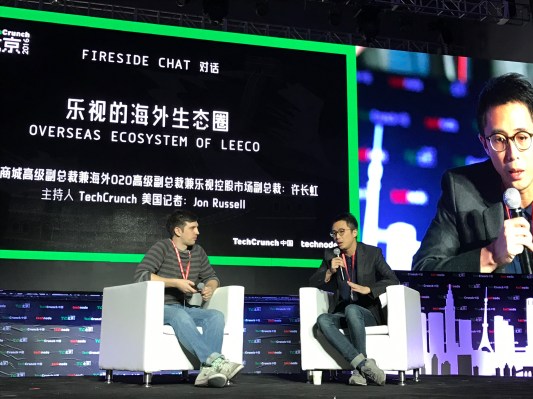Billionaire CEO Yueting Jia told employees in a letter last week that the company’s rapid growth was leading to stagnation and management problems at LeEco, and announced that he would invest $10 million into the company and cut his salary to 15 cents in order to keep LeEco steady as it expands into the United States and develops a self-driving car.
But North American operations lead Brian Hui told the audience at TechCrunch Beijing today that things aren’t as dire as the letter made them seem. “If you read the letter, it’s not about whether it’s sustainable or not sustainable,” Hui said of LeEco’s growth. “It’s not about running out of money. It’s how you can spend your money wisely… You go through a very aggressive user base growth period before you enter a financially sustainable period. I think this is pretty normal, applying to any kind of startup.”
Although the letter led to rumors that LeEco would abandon the development of a self-driving vehicle, Hui said that work on the car was a “highest priority” and would continue. Hui said that he does not anticipate layoffs on the U.S. team, which has grown from 30 to nearly 600 over the course of the year. The U.S. staff of LeEco is primarily focused on research and development for smart devices and internet ecosystems, he said.
“Fast is not about staffing, it’s more about whether you hire the right people,” Hui said.
Hui also addressed rumors that suppliers for LeEco’s smartphone business had not been paid, saying that LeEco was not carrying debt to its suppliers. “We will always want to sustain our trust,” he said. “We still maintain a very good relationship with them.” During the U.S. launch of its smartphone two weeks ago, LeEco says all of the phones sold in a little over four hours but declined to say exactly how many units were sold.
LeEco launched its first products in the U.S. recently in a big international push. And amid all the chatter of growing too fast, that’s raised questions as to whether LeEco’s move to launch in the U.S. market was the right one. Still despite this, Hui said the company — as it moves on to what he called “phase 2” — was trying to focus on building a more healthy financial operation. So, to that extent, it would seem from Hui that U.S. expansion was already baked into those expectations.
[gallery ids="1413150,1413148,1413147"]
That launch was accompanied with a massive splashy event in the hopes of placing an exclamation point on the company’s entry into the U.S. Gunning for that kind of publicity, it would seem that the company had very high ambitions for its international expansion. That made the letter sent by Jia to lead to even more scrutiny for the company, given that it hoped to heavily invest in its expansion into highly-competitive markets.
For the U.S., it isn’t just about phones and TVs, Hui said. The company is hoping to replicate all of what Hui said were its successes in China. That includes not only its hardware operations, but also content and other ecosystems. Hui said that “smart devices” would be the company’s entry point into the U.S. It’s still going to be an uphill battle across the board, but LeEco is hoping to somehow couple the experiences together using online services, Hui said.
“When I was a kid, I used [the Sony] Walkman, but all [Sony’s devices] are silo’d,” Hui said. “If you ambition to have other disruptive services, you want to provide the best service to your customer. And to add value to the customer, you need to have something that couples the entire experience. That’s Internet and cloud.”
Jia said in his letter that he would require management to meet a “higher bar” and encourage more collaboration between LeEco’s disparate product teams. “This is the most difficult year in LeEco’s history,” he wrote. “Rumors plunged us into the abyss of hardship and adversity with the stock price of Letv.com falling to rock bottom.”
Despite Hui’s optimism, there was a lot to unpack in that letter. And it placed a cloud of uncertainty around the company, which Hui tried to clear out.
“I think the most important thing is about not just the letter but the substance in the letter,” he said. “How sincere, how honest, is this company of the thing we are trying to build globally. Between the choices of hiding things, we generally share the challenge we are facing today. The consistent message of the ecosystem we are trying to build, I hope and I believe that if the crowd here or the users pay attention to LeEco, and the users who are using our products and services, you will share and believe that the ecosytem we are trying to build is not just for now but for the future.”
